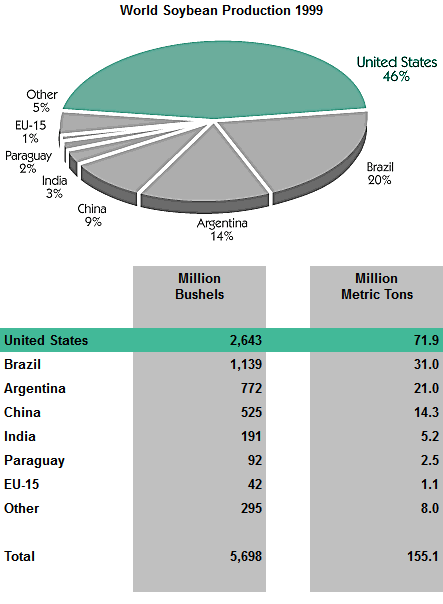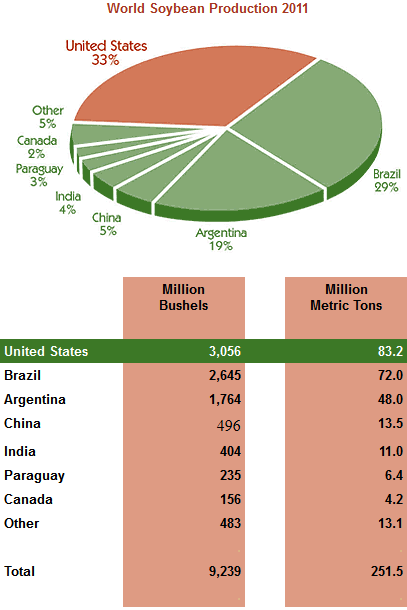
You thought soybeans were healthy?
Not so fast!
Almost everyone’s blinded by advertisements and one-sided information.
I always thought soy was healthy because everyone was eating it and everyone recommended it, until I found out what soy was REALLY doing to our health.
Let me warn you, stop soy now. It’s actually doing more harm than all of its benefits combined.
The Soy Business
Soy business is big, let’s just talk about the last 12 years (and that is to exclude the tiny numbers back each year). In 1999, the total world production of soybean grew from this:

To this in 2011:

Source: http://www.soystats.com/
Here are more stats if you’re interested.
The numbers may not seem big, but do you know how much a million metric tons is?
Let’s look at this way.

2011’s soybean production is equal to the great pyramid of Giza but 42 times, in mass.
Okay, enough with the facts.
Soy is a big business in our society today, most of us think it is healthy. We’ve been misled.
Soy is bad.
The Truth About Soybeans
Most soybeans in the market today are GMO (genetically modified organism), why? Because farmers get to yield more crops, stronger crops and that means more money.
At the expense of our health.
91% of US soy and 98% of Argentinian soy are GM.
What are diseases linked to GM soy consumption?
- Malnutrition
- Digestive problems
- Thyroid dysfunction
- Cognitive decline
- Reproductive disorders
- Sterility
- Infant mortality
- Birth defects
- Immune system breakdowns
- Heart disease
- Cancer
Here’s something more interesting about what Americans believe:
The United Soybean Board did surveys on consumer and found out that in 1997, 59% of the people thought soy products were “healthy.”
Wait.
In 2008, 85% of the people thought soy products were “healthy”.
This is the power of one-sided stories – propaganda for commercial interests.
Okay, is soy really that bad?
Properties of Soy Explained
1. Free Radicals
These days soy oil is always promoted for its high omega-6 fatty acids content, commercial soy oil is always heated to high temperatures, making the oil go rancid.
Soybean seeds contain the highest source of lipoxygenase, which activates and promotes oxidation. Consuming rancid oil from soy is bad because its oxidized fatty acids will continue to be used by your body, at the end your cell membranes that use them become damaged due to oxidative stress, which promotes degradation to your the cells and tissues.
2. Phytates
Soy naturally contains phytates, they are naturally found in plants (but high concentrations in soy), as part of their normal growing mechanism – think of phytates are a “pause” to allow a preceding “spike” in growth.
Good for plants, but bad for us. Why?
Because when phytates are digested in our body along with everything else, they bind tightly to metal ions, causing inability in absorption of useful nutrients.
Long term consumption of phytates can result in: iron-deficient anaemia, osteoporosis, neurological symptoms and endocrine symptoms.
3. Protease Inhibitors
Soybeans contain protease inhibitors. Protease plays a key role in our digestion, however when faced with soy, our digestive enzymes are stopped from proper functioning,
Long term consumption results in: malabsorption of useful nutrients, pancreatic disease, digestive problems and contributes to cancer.
4. Saponins
Saponins are a type of antinutrients, let the research put it this way:
“The results indicate that some saponins readily increase the permeability of the small intestinal mucosal cells, thereby inhibiting active nutrient transport, and facilitating the uptake of materials to which the gut would normally be impermeable.”
5. Hemagglutinin
Hemagglutinin is a substance that causes red blood cells to stick together, this means more clots within your bloodstream. This prevents the tissues that require a supply of oxygen from getting what they need.
6. Goitrogens
Goitrogens are substances that disallow the thyroid hormones from synthesizing, it also disallows proper metabolism with iodine. In case you didn’t know, iodine is necessary and extremely important for thyroid health.
7. Estrogen
Phytoestrogens (namely isoflavones in soy) are natural compounds found in plants that work similarly like estrogen, the female sex hormone. Once absorbed into the body, it blocks and slows down the normal functioning of human’s natural estrogen.
This leads to degradation of the sex hormone in human beings and can result in: breast cancer, endocrine function disruption, infertility and affecting the menstrual cycle.
Soy is bad news for men because of the natural components of soy that exist.
Let’s put it this way, there’s this person in Vietnam who was diagnosed with gynecomastia and his estrogen levels were found to be eight times higher than the normal limits for men; this man experienced strange sexual changes:
- Slowed growth and loss of facial hair and body hair.
- Stopped morning erections.
- Loss of sexual appetite.
- Shrink in penis size
- Change into a feminine emotional mindset.
As a teenager growing up, I go to the gym every two days and I need my testosterone levels up high to build muscle, I was shocked after reading about this. Luckily, I stopped my daily glass of soy milk. That’s something very common in China. Now I understand why everyone’s so…. you know.
Heavy Soy Diet in Prison Led to Lawsuit

When Rod Blagojevich was elected governor of Illinois in 2002, he changed the prison’s diet.
The meats in the diets were often mixed along with 60-70% soy protein, even cheese is replaced with fake cheese. This was all due to financial reasons.
Numerous of dietary change requests have been made but the prison’s response was merely “eat or don’t eat”. The inmates had no choice; they were forced to eat excessive amounts of soy foods because many of them had no money to purchase from the commissary.
Long term consumption of this heavy soy diet led to health problems for the inmates:
- Chronic constipation alternating with diarrhea
- Vomiting
- Sharp pains in the digestive tract (many inmates had parts of their digestive tract removed)
- Passing out
- Heart palpitations
- Rashes
- Acne
- Insomnia
- Panic attacks
- Depression
- Hypothyroidism symptoms e.g. low body temperature
- Brain fog
- Tiredness
- Weight gain
- Frequent infections
- Enlarged thyroid gland
- Possibility of young prisoners becoming sterile due to soy’s natural compounds
These are all problems that have been reported within the 4 years since the change of soy-based diets until Weston A. Price Foundation discovered this from several inmates and decided to take action.
The foundation set up the Soy Alert! Campaign and filed a lawsuit against this inhumane cruelty.
Here’s the link to the lawsuit and the ploy of soy.
The Good Side of Soy

Still skeptical about this new finding?
Actually, this is not a new finding and let me remove your doubts.
Soy is not 100% bad.
Soy is healthy after fermentation.
That’s why people from ancient China, Japan and several other places in the world have never had serious problems with the practice of eating unfermented soy.
What makes fermented soy different from just soy?
During fermentation, soy is left within acidic mediums for a period of time allowing the substances to undergo chemical reactions, this reaction leaches phytates out of soy (mentioned earlier as the antinutrient that binds strongly to essential metal nutrients).
When the majority of phytates found inside soy has been transported out, it can be safely eaten for its maximum health benefits without getting its “it comes at a price” harmful effects.
Common fermented soy sources:
- Organic soy sauce (read labels as some are artificially made)
- Soybean paste
- Miso
- Tempeh
- Natto
- Gochujang
Here’s a more detailed list from Wikipedia on fermented soy products.
By the way, tofu is unfermented, so avoid it.
Recommendations for Eczema Sufferers
If you eat outside (which you shouldn’t be unless you really know what’s being cooked, how it’s cooked and what’s being added), you’ll definitely face unfermented soybean dishes every once in a while.
If you really can’t get out of eating it because of social conventions e.g. trying your friend’s new dish, then give it a bite. Our body was designed to detoxify after all.
It’s recommended to never eat unfermented soy food. You won’t die if you eat it but if you want to promote the fastest recovery for your eczema and for the best of your skin, don’t eat any at all.
Eating fermented soy products are not strictly safe. Why?
It won’t give you a bloody rash overnight but again, to promote the fastest recovery for eczema, all fermented products should be avoided as they contain yeasts, and yeasts can interfere with the digestive tract and slow down natural gut healing.
Even if you don’t have eczema, high consumption of unfermented soy products is still unhealthy. Only consume in moderate amounts.
Simple Takeaway
No unfermented soy products.
For the best health and if you know your gut is healthy (eczema sufferers your gut is not healthy), only consume in moderate amounts.
Soy is dangerous.
The media often report its benefits without telling you its harmful effects. Now you do, let your friends and family know!
Were you 1 of the 85% that thought soy was “healthy”?
Think again.